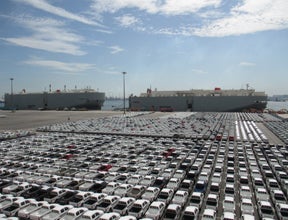
The US has agreed to lower tariffs on Japanese car imports to a final rate of 15%, following successful negotiations between representatives of their respective governments.
The deal appears to have put an end to months of uncertainty for the Japanese auto industry, after US president Donald Trump announced earlier this year that he would hike duties on all new vehicles entering the country to 25% from 1 August, ahead of bilateral negotiations with its key trading partners.

Discover B2B Marketing That Performs
Combine business intelligence and editorial excellence to reach engaged professionals across 36 leading media platforms.
Most imported cars currently face a 25% base import tariff rate from next month, but Japanese auto imports could drop to 15% rate from 1 August.
The preliminary US-Japan trade deal follows announcements by some Japanese carmakers to up their US manufacturing investments.
Embattled Japanese Prime Minister, Shigeru Ishiba, who rejected calls for his resignation from inside and outside his party after his recent defeat in the House of Councillors elections, said his government “negotiated arduously with national interests at stake on various items including automobiles.” He pointed out that “while the deal protects Japan’s national interests, it will also help create employment in both Japan and the US.”
Donald Trump described the outcome of the negotiations as “the largest trade deal in history,” with Japanese companies agreeing to invest up to US$ 550 billion in the US to help support the country’s manufacturing industry.
News of the deal sent share prices on the Tokyo Stock Exchange soaring, with Toyota’s share price jumping by 15% in a single day, while Honda’s share price soared by 12% and Nissan was up by 11%. Japanese automakers exported almost 1.5 million vehicles to the US last year, worth some US$ 41 billion.
US automakers, however, said the deal with Japan would put them at a significant disadvantage, given that they face much higher tariffs on imports of components and raw materials such as steel and aluminium.
Matt Blunt, president of the American Automotive Policy Council which represents General Motors, Ford and Stellantis, said in a statement: “American automakers still need to review the details of the US-Japan agreement, but any deal that charges a lower tariff for Japanese imports with virtually no US content than the tariff imposed on North American built vehicles with high US content is a bad deal for US industry and US auto workers.”
The United States, like most countries, has virtually no auto exports to Japan. Analysts say Japanese buyers are unlikely to significantly shift preferences to US auto products even if they become cheaper to buy there.






